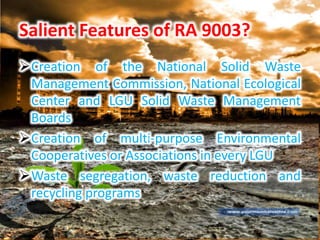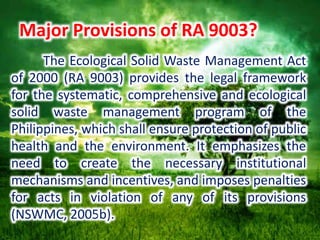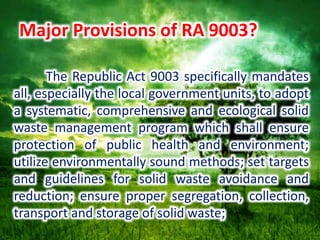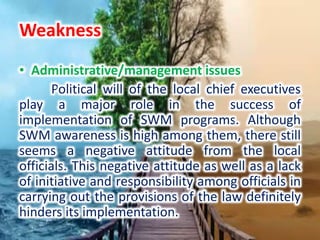Ecological Solid Waste Management Act of 2000(RA 9003 )
- 2. What is RA 9003? An Act providing for an ecological solid waste management program, creating the necessary institutional mechanisms, declaring certain prohibited acts.
- 3. Salient Features of RA 9003? Creation of the National Solid Waste Management Commission, National Ecological Center and LGU Solid Waste Management Boards Creation of multi-purpose Environmental Cooperatives or Associations in every LGU Waste segregation, waste reduction and recycling programs
- 4. Salient Features of RA 9003? Construction of Material Recovery Facilities/Systems Conversion of open dumpsites to sanitary landfills Integration of Ecological Waste Management concepts in academic curricula for formal and non-formal education Administrative and enforcement procedures
- 5. Major Provisions of RA 9003? The Ecological Solid Waste Management Act of 2000 (RA 9003) provides the legal framework for the systematic, comprehensive and ecological solid waste management program of the Philippines, which shall ensure protection of public health and the environment. It emphasizes the need to create the necessary institutional mechanisms and incentives, and imposes penalties for acts in violation of any of its provisions (NSWMC, 2005b).
- 6. Major Provisions of RA 9003? The Republic Act 9003 specifically mandates all, especially the local government units, to adopt a systematic, comprehensive and ecological solid waste management program which shall ensure protection of public health and environment; utilize environmentally sound methods; set targets and guidelines for solid waste avoidance and reduction; ensure proper segregation, collection, transport and storage of solid waste;
- 7. Major Provisions of RA 9003? promote national research and development programs for improved SWM; encourage greater sector participation; retain primary enforcement and responsibility of SWM with local government units; encourage cooperation and self-regulation among waste generators; institutionalize public participation; and strengthen the integration of ecological solid waste management, resource conservation and recovery topics into the academic curricula.
- 8. Weakness • Administrative/management issues Political will of the local chief executives play a major role in the success of implementation of SWM programs. Although SWM awareness is high among them, there still seems a negative attitude from the local officials. This negative attitude as well as a lack of initiative and responsibility among officials in carrying out the provisions of the law definitely hinders its implementation.
- 9. Weakness • Economic and Financial issues While the national government encourages full implementation of the law, it does not provide any cost-sharing grants to LGUs to help them address SWM issues. These in turn, have hindered the full implementation of a comprehensive solid waste management.
- 10. Weakness • Technical issues As mandated by the Act, each LGU, through its solid waste management board, is tasked to create a ten-year’s SWM plan, in order to help them carry out the provisions of the law. However, according to the NSWMC, most LGUs have communicated that they do not have the technical capability to do this on their own. They need a lot of help in the formulation of their SWM plans from the national government in coordination with other agencies.











